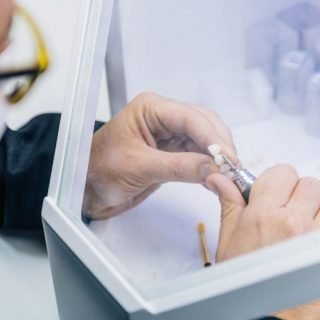Protecting Your Teeth From The Very Start
Fluoride Treatment
Children in particular benefit from fluoride treatment. As adult teeth come in, fluoride treatments help combat tooth decay through a process called remineralization. Acids from plaque and from the food we eat can wear down tooth enamel by sapping teeth of certain essential minerals. Fluoride treatment stops and reverses this process making tooth enamel stronger and more resistant to decay.
Dental Sealants
The biting surfaces of molars have plenty of grooves and fissures that can easily trap acidic plaque or food particles which may be difficult to clean. When children get new molars, dental sealant can be used to keep gunk out, protect their natural teeth and prevent decay. Dental sealants provide a protective shield for those vulnerable areas.
Why Opt For Sealants And Fluoride?
The Canadian Dental Association supports the appropriate and selective use of sealants for both primary and permanent teeth based on a risk assessment and diagnosis by a dentist. According to the CDA, sealants are an important component of a comprehensive preventive program, which includes nutritional counselling, optimal fluoride exposure, good oral hygiene and regular dental examinations.

What Are Dental Implants?
An implant is a small metal screw that replaces an entire tooth. In a brief surgical procedure, the dentist inserts an implant into the bone beneath your gums right in the spot where a tooth should be. The implant acts like a natural tooth root and is finished off with a restoration such as a dental crown to help it look and feel just like a real tooth.
Getting dental implants is a big deal. You think you might like an implant, but you aren’t sure what to expect. We explain everything here so that you can make an informed decision about your dental treatment.
Why You Might Need Dental Implants
Your natural teeth provide support for the height and shape of your smile, and they allow you to eat and speak comfortably.
A gap in your smile could allow your other teeth to drift out of healthy functional alignment. If that happens, your risk of developing oral health problems increases. Losing just one tooth can trigger a chain of events in your mouth that negatively impact your oral health, the appearance of your face, and your overall quality of living.
Even if you don’t experience these effects of missing teeth, there’s one problem you can’t avoid: bone resorption. This is a natural process in which your body breaks down non-essential bone tissue to use the minerals elsewhere in your body.
When you have teeth in your jawbone, they push against it and stimulate the production of new bone tissue. But once those teeth are gone, that bone tissue serves no useful purpose, so it slowly dissolves away. The result? A shortened jaw and chin that cause wrinkles and give your cheeks and lips a sunken appearance.
Having dental implants is the second best thing to having natural teeth. You can prevent or correct the issues listed above by replacing lost teeth with implants.


The Benefits Of Dental Implants
Losing a tooth can be devastating. A missing tooth can make us feel self-conscious about our smile and may lead to a variety of health problems. Gaps can make your bite feel uncomfortable, cause difficulties eating the food you love and may lead to bone loss or shifting teeth.
- Restore your natural appearance – Dental implants look and feel like your own teeth. They become permanent, “perfect” teeth as they are custom made to blend in with your smile. Implants look natural because they are sized, shaped and coloured to match your unique bite and natural enamel colour.
- Feel confident in your comfort – When a dental implant is placed your jaw bone actually fuses with the titanium post as it heals. A crown or bridge can be permanently affixed to the post or the implant may be used to secure implant-supported dentures but one thing is certain: That dental implant is not moving. Laugh, smile and eat your favourite foods. Shifting teeth or sudden pain won’t even cross your mind.
- Improve bone strength – When teeth are lost, the bone that supports those teeth can begin to atrophy and weaken over time. Dental Implants stimulate new bone growth around the implant, strengthening the bone structure.
Dental implants are a long-term solution that feels natural and lasts decades with proper oral hygiene.
Dental Implant Restorations
A restoration is the “false tooth” that covers the implant. The implant is not visible when you smile, but the restoration that covers it is what makes it look like you have a new tooth.
- Dental Crown – This is the most common implant restoration, and it covers a single-tooth implant.
- Dental Bridge – A bridge spans the gap in places where multiple teeth in a row are missing. You can replace several teeth with just one or two implants that support a dental bridge. A full implant-supported bridge is an entire arch of upper or lower teeth that are fixed to four or more implants.
- Implant Denture – Give a removable denture more stability by clipping it onto two small implants.


How It Feels
Although having a metal implant inserted into the bone of your mouth sounds painful, the procedure is far more comfortable than you might expect.
We will numb your mouth with a mild anesthetic so that you don’t feel any pain during the surgery. Advanced dental technology allows us to place implants quickly, accurately, and conservatively. This means less discomfort and downtime for you during recovery.
Some implant patients report feeling bored and even sleepy during the brief half hour it takes to place their implant. The most uncomfortable part for you may be having to hold your mouth open for a few minutes at a time, but that’s all.
It is normal to experience some swelling, discomfort, and even bruising in the next several hours after the procedure. The pain is mild and very easy to manage, however. We will give you specific instructions so that you can start minimizing the discomfort before the anesthetic wears off. Your surgical implant site should start feeling better within a week.
It might help you to know that dental implants have a success rate of nearly 95%. Getting an implant is one of the safest and most predictable procedures in dentistry.
What To Expect On Your Dental Implant Treatment Journey
The actual implant placement process is much more comfortable than you might imagine.
Assessment
Inserting the implant
Finalizing the restoration
Absolutely no one ever has to know that your implants are not your natural teeth. Dental implants are made of metal screws, but these are hidden beneath your gums and covered with lifelike restorations that blend in naturally with the rest of your smile.
Dentures and implants are not the same thing and they function in very different ways. Dentures rest on top of your gums and press down on the underlying bone tissue. Implants strengthen your bite because they are fixed well below your gums. Both tooth replacement options have unique pros and cons. We recommend that you visit us in person to find out which treatment is best for you.
For patients who are not good candidates for dental implants, dental bridges and full or partial dentures may be the best option for replacing missing teeth. The best way to find out what solutions exist for your specific needs is to call and book an appointment. We would be happy to discuss all your options and answer any specific questions you may have.
To get an implant you must be an adult and have good general oral health. Your jawbone must be strong enough to support a new implant and other supporting tissues, like your gums, must be healthy to reduce the risk of complications. If you’re concerned that you might not be a viable candidate, give us a call to find out for sure. There are usually treatment options available to restore your oral health with the ultimate goal of getting a dental implant and there are often alternative solutions to replacing missing teeth.
Yes! Your dental implant may be topped by a crown, a bridge or implant-supported dentures that will always be custom made to make you feel comfortable. That means your custom-made teeth are shaped and coloured to match your existing teeth and bite. Patients often have difficulty distinguishing their natural teeth from their beautiful new dental implants.
The science of dental implants has evolved so rapidly from its early days that it is now a very predictable and relatively pain-free procedure. The dental implant procedure is completed with such care and precision you’ll experience as little discomfort as possible. With proper aftercare, you can expect minimal swelling and almost no bleeding. Your physical and emotional health are both important to us. If you feel anxious about visiting us for any reason, please let us know.
In most cases, you can return to work the day after your implant surgery. Once we know exactly what your treatment will entail, we can give you a much more accurate time estimate and can let you know in advance if you should clear your schedule for longer. We always discuss all post-operative care instructions with you.
The success of your implants will depend greatly on how well you maintain them. They need to be professionally cleaned and examined routinely, just like your natural teeth. We usually recommend a check-up approximately every 6 months but may recommend check-ups more or less often depending on your specific requirements.
No, implants do not need to be routinely replaced. Once you get a dental implant, it is meant to stay with you for a very long time.

